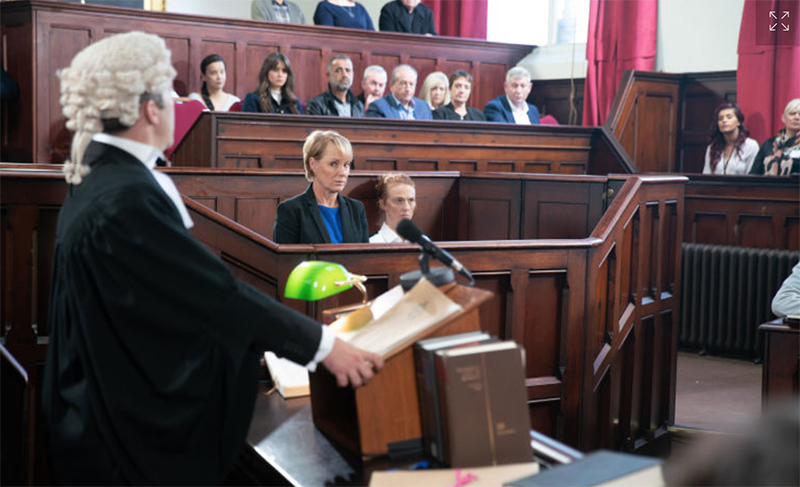The Dramatisation of the Criminal Justice System on UK TV : A History of TV Courtroom Dramas

How TV has captured the public’s fascination with the criminal justice system over the years.
Television has long been a powerful medium for exploring societal structures, and the criminal justice system is no exception.
Here in the UK, courtroom dramas have evolved from austere representations of legal proceedings to gripping, character-driven narratives that captivate audiences while probing deeper ethical and moral questions.
This article explores the evolution of these dramas on UK Television, examining how they mirror societal attitudes toward justice and the law.
The Early Days: Procedural Realism
The roots of courtroom dramas on UK television can be traced back to shows like Crown Court (1972–1984).
Airing on ITV, this series offered a quasi-documentary style, presenting fictional cases with real jurors who decided the verdict.
Its aim was both to entertain and educate, shedding light on the workings of the British judicial system.
Rather than focusing on dramatic personal conflicts, Crown Court maintained a procedural tone, emphasising the intricacies of law and the gravity of courtroom decision-making.
It reflected a time when television was seen as a tool for public education, fostering understanding of how the justice system operated.
The Shift to Character and Morality: 1990-s and Beyond
By the 1990s, courtroom dramas began to shift their focus.
Rather than centering purely on legal procedures, series like Kavanagh QC (1995–1999) introduced emotionally complex lawyers and layered narratives.
Starring John Thaw, the series delved into the personal lives of its characters, exploring how their moral compasses intersected with the law.
This era also saw a move toward dramatizing not just the trial but the entire legal process, from investigation to conviction.
Shows like Silent Witness (1996–present) and Judge John Deed (2001–2007) brought forensic science and judicial dilemmas into the fold, broadening the scope of legal dramas and integrating themes of political corruption, societal bias, and personal accountability.
Courtroom Drama as Social Commentary
Modern UK courtroom dramas often function as microcosms of larger societal issues.
For instance, The Trial: A Murder in the Family (2017) used a hybrid format combining scripted drama with real-life legal professionals to explore the psychological toll of the trial process.
Meanwhile, Criminal: UK (2019–present) examines interrogation dynamics, stripping the drama down to a single room and emphasizing the psychological chess match between detectives and suspects.
This pivot reflects a shift in audience expectations.
Viewers are no longer content with straightforward legal dramas; they crave stories that challenge perceptions of justice, power, and morality.
Issues like systemic racism, gender bias, and class disparities have become central themes, making courtroom dramas a vehicle for broader social critique.
Dramatic License vs. Realism
A recurring debate in courtroom dramas is their balance between realism and dramatic license.
While shows like Crown Court prioritised authenticity, contemporary dramas often heighten emotions and manipulate narratives to sustain engagement.
Critics argue that this risks distorting public understanding of the judicial process, portraying it as overly sensationalised or ethically murky.
For example, Judge John Deed faced criticism from legal professionals for its portrayal of a maverick judge who frequently broke protocol to achieve justice.
While engaging, such depictions can blur the line between fiction and reality, creating misconceptions about how the legal system functions.
The GlobaliSation of Courtroom Dramas
In recent years, UK courtroom dramas have drawn inspiration from international formats while maintaining their unique approach.
Series like Criminal: UK adapt the minimalist, dialogue-heavy structure seen in European counterparts, emphasizing psychological tension over action.
Similarly, collaborations with streaming platforms have introduced British legal dramas to global audiences, amplifying their impact and diversifying their themes.
SUMMING UP
From the procedural realism of Crown Court to the morally complex narratives of Kavanagh QC and Criminal: UK, courtroom dramas on UK television have undergone a remarkable transformation.
These shows have not only entertained but also served as mirrors to societal values and tensions, evolving alongside shifts in public attitudes toward justice and fairness.
As long as UK television continues to produce compelling courtroom dramas, they will remain an essential lens through which audiences grapple with the nature of the ever-changing landscape of morality, power, and the law.
How We Can Help
Away from the television and the media of course, we are here to support you in real life. Should you have any questions or concerns regarding the implications of the law you can contact us on 0161 477 1121 or email us for more information.


